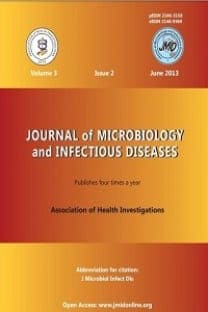Knowledge, Attitude and Practices of Patients as Regard to Tuberculosis
Tuberculosis, Knowledge, Practice Delay, Care-seeking,
___
- 1. Kempinski R, Krasnik A. Prevention of arteriosclerotic heart disease. An epidemiological study of knowledge, attitudes and practices in a community in Israel. Ugeskr Laeger 1974; 136:1931-1938. 2. Suleiman M, Sahal N, Sodemann M, Elsony A. Tuberculosis awareness in Gezira, Sudan: knowledge, attitude and practice case–control survey. East Mediterr Health J 2014; 20:120-129. 3. Khalil A, Abdalrahim M. Knowledge, attitudes, and practices towards prevention and early detection of chronic kidney disease. Int Nurs Rev 2014; 61:237–245. 4. Matsumoto-Takahashi EL, Tongol-Rivera P. Patient knowledge on malaria symptoms is a key to promoting universal access of patients to effective malaria treatment in Palawan, the Philippines. PLoS One 2015; 10(6):e0127858. 5. Masud R, Abu S, Reazul K, Nurul I. Assessment of knowledge regarding TB among non-medical university students in Bangladesh: a cross-sectional study. BMC Public Health 2015; 15:716. 6. Bansal AB, Pakhare AP, Kapoor N. Knowledge, attitude, and practices related to cervical cancer among adult women: a hospital-based cross-sectional study. J Na Sci Biol Med 2015; 6:324-328. 7. Teran CC, Gorena UD, Gonzalez BC. Knowledge, attitudes and practices on HIV/AIDS and prevalence of HIV in the general population of Sucre. Braz J Infect Dis 2015; 19:369–375. 8. Francisco GS, Jay CB, Daniel BJ, Larry JS. Treating cardiovascular disease with antimicrobial agents: a survey of knowledge, attitudes, and practices among physicians in the United States. Clin Infect Dis 2001; 33:171–176 9. Biya O, Gidado S, Abraham A, et al. Knowledge, care-seeking behavior, and factors associated with patient delay among newly-diagnosed pulmonary tuberculosis patients, Federal Capital Territory, Nigeria. Pan Afr Med J 2010; 18 (Supp 1):6. 10. Okeibunor JC, Onyeneho NG, Chukwu JN, Post E. Where do tuberculosis patients go for treatment before reporting to DOTS clinics in southern Nigeria? Tanzania Health Research Bulletin 2007; 9(2):94–101. 11. Isara AR and Akpodiete A. Concerns about the knowledge and attitude of multidrug‑resistant tuberculosis among health care workers and patients in Delta State, Nigeria. Nigerian Journal of Clinical Practice 2015; 18 (5). http://www.njcponline.com 12. Abioye IA, Omotayo, MO, Alakija W. Socio-demographic determinants of stigma among patients with pulmonary tuberculosis in Lagos, Nigeria Afr Health Sci 2011; 11(S1):S100–S104. 13. Ibrahim LM, Hadejia IS, Nguku P, Dankoli R, Waziri NE, Akhimien MO. Factors associated with interruption of treatment among pulmonary tuberculosis patients in Plateau State, Nigeria. Pan Afr Med J 2014; 17:78. 14. Bisallah CI, Rampal L, Munn-Sann L, et al. Effectiveness of health education intervention in improving knowledge, attitude, and practices regarding Tuberculosis among HIV patients in General Hospital Minna, Nigeria – A randomized control trial PLoS One 2018; 13(2): e0192276. 15. National Population Commission. The Nigeria 2006 census figure, 2006. http://www.nigeriamasterweb.com 16. Hoiberg DH (2010) "Aba". Encyclopædia Britannica. I: A-Ak – Bayes (15th ed.). Chicago, Illinois: Encyclopædia Britannica, Inc. ISBN 978-1-59339-837-8. 17. Israel GS. Determining Sample Size. Program Evaluation and Organizational Development, IFAS, University of Florida (PEOD6) Agricultural Education and Communication Department, UF/IFAS Extension 2003, http://edis.ifas.ufl.edu Retrieved November, 2017. 18. World Health Organization. A Guide to Developing Knowledge, Attitude, and Practice Surveys Suiza: WHO; 2008. 19. Cohen J, Cohen P. Applied Multiple Regression/Correlation Analysis for the Behavioral Sciences. New York, 1983; Taylor & Francis. 20. Tapera O, Kadzatsa W, Nyakabau AM, et al. Sociodemographic inequities in cervical cancer screening, treatment and care amongst women aged at least 25 years: evidence from surveys in Harare, Zimbabwe. BMC Public Health 2019; 19:428. 21. Wandwalo ER, Morkve O. Knowledge of disease and treatment among tuberculosis patients in Mwanza, Tanzania. Int J Tuberc Lung Dis 2000; 4(11):1041-1046. 22. Onyeonoro UU, Chukwu NJ, Oshi DC, Nwafor CC, Meka AO. Assessment of tuberculosis-related knowledge, attitudes and practices in Enugu, South East Nigeria. J Infect Dis Immun 2014; 6(1): 1-9.
- ISSN: 2146-3158
- Başlangıç: 2011
- Yayıncı: Sağlık Araştırmaları Derneği
Mohammed A IBRAHİM, Khalid A ENAN, Abdel Rahim M EL HUSSEİN, Mohamed O. MUSTAFA, Bashir SALİM, Isam M ELKHİDİR
Hind Abdelrahman HASSAN, Khoubieb Ali ABDELRAHMAN, Nasr Mohammed NASR, Yassir A. ALMOFTİ
Abubakar Tukur Dawakin KUDU, Sami ILİYA, Akinfenwa Taofeq ATANDA, Nasiru Abdullahi ISMAİL, Abdurrahaman Abba SHEHE
Chaitra GOVARDHAN, Christi Dominic SAVİO, Susan VERGHESE
Maxwell OLENSKİ, Lisa BRENTON, Lee TAYLOR, Tim PAPALUCA, Amy CROWE
Seyed Alireza MOUSAVİ, Seyed Masoud MİRATASHİYAZDİ, Saeed KARGAR, Seyed Hossein SHAHCHERAGHİ
Chijioke A. NSOFOR, Ugochiturum S. OKONKWO
Monica BRİCCHİ, Annalia ASTİ, Alessia PASCALE, Franco ANDREİNİ, Milena ARGHİTTU, Dario CALDİROLİ, Carla CAROZZİ, Anna PAVAN
Ato Kwamena TETTEH, Godsway AGLAGOH, Charles BAFFE, Sadick ARTHUR, Prince BRAM, Gifty Rhodalyn TETTEH, Edward AGYARKO
Zulfiqar Ali MİRANİ, Shaista UROOJ, Fouzia ZEESAHN, Muhammad Naseem KHAN, Mubashir AZİZ, Izhar Ahmed SHAİKH, Abdul Basit KHAN
